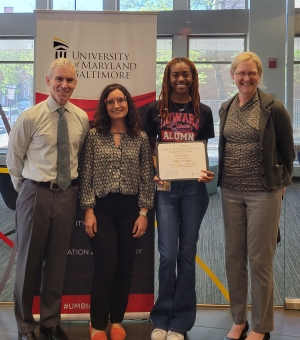Aziza Frank Awarded Second Prize for 15th Annual Graduate Translational Research Award
Friday, July 28, 2023

In 2021, the World Health Organization (WHO), compiled a list of antibiotic-resistant pathogens that pose the greatest threat to human health. Pseudomonas aeruginosa was designated a priority one pathogen – the highest level – due to its ability to cause severe and often deadly infections, extreme versatility, antibiotic resistance, and a wide range of dynamic defenses. Infections from this pathogen pose a serious threat to our communities, causing more than 32,000 infections and 2,700 deaths in 2017 alone. The pathogen commonly develops in burn wounds, airways, or on medical implant devices; is the leading cause of persistent respiratory infection in cystic fibrosis patients; and is the second leading cause of ventilator-associated pneumonia in intensive care facilities.
Aziza’s research aims to enhance the potency and efficacy of a novel antipseudomonal agent called gallium-salophen-3 (GaSal-3). GaSal-3 is a dual-targeting small-molecule therapeutic that inhibits two proteins crucial for iron acquisition and the survival of Pseudomonas aeruginosa. Unlike existing antibiotics for Pseudomonas aeruginosa, GaSal-3 targets this pathogen through a mechanism that does not trigger virulence or induce multidrug resistance. These critical factors associated with Pseudomonas aeruginosa infections are effectively addressed by GaSal-3. Successful development of GaSal-3 is expected to decrease infections and greatly improve the life of burn wound and surgical patients, medical implant device users, and cystic fibrosis patients that suffer with life-threatening chronic infections.
“Known iron-chelator antipseudomonal agents have found limited success,” said Dr. Xue. Aziza’s novel GaSal complexes circumvent this issue by inhibiting Pseudomonas’s ability to sense and utilize heme the primary source of iron in chronic infection. Aziza’s research project represents a novel multi-targeting therapeutic formulation of gallium with increased efficacy and lower propensity to develop resistance.”
With practical application in mind, Aziza is interested in developing a nasal spray delivery system to administer the new treatment directly to the lungs, a common site of Pseudomonas aeruginosa infections. Once confirmed that the lead compound(s) show good efficacy, no toxicity, and are effective in mouse models, the group envisions that their laboratory research could lead to clinical trials, bringing us closer to patient care. Additionally, determining an effective therapeutic strategy for targeting Pseudomonas aeruginosa infection could aid the scientific community in developing therapies for other challenging pathogens.
“Our group was excited to meet Aziza and hear her zeal for applied research,” said Phil Robilotto, associate vice president for technology transfer at University of Maryland, Baltimore (UMB) and director of UM Ventures, Baltimore. “It’s critically important to develop new antimicrobial drugs to tackle the growing problem of drug-resistant infections.”
UM Ventures, Baltimore team members, Mark Wozniak, assistant director of technology licensing, and Shari Corin, senior patent attorney, are providing guidance to Drs. Wilks and Xue’s groups on the long-term development of their intellectual property.
Aziza’s project is part of an ongoing research program by her mentors, Drs. Wilks and Xue. Their previous dual PhD student, Garrick Centola, PhD, also contributed to this research project. Upon joining the research team, Aziza directed her efforts toward optimizing the potency and efficacy of the compounds synthesized in Dr. Xue’s lab.
Although Aziza still has a few years to go, she is already contemplating her future after completing her doctoral degree. Her aspirations include gaining valuable experience working at a pharmaceutical company before transitioning to research. Ultimately, Aziza has the admirable goal of establishing her own lab dedicated to researching ailments that disproportionately affect people of color, such as HIV/AIDS, sickle-cell anemia, Hepatitis C, heart disease, or cancer. She also envisions her lab as a place committed to hiring and developing underrepresented minority scientists.
“Often times, due to the lack of diversity, certain groups of people are overlooked leading to increased health disparities. I think that increasing the number of underrepresented minority scientists would help to mitigate this issue,” said Aziza. “I would also like to work with other scientists I’ve met during my journey to create outreach programs, host career panels, create scholarships, and become mentors to underrepresented minority students interested in pursuing STEM.”
The Graduate Translational Research (GTR) award, presented in conjunction with the University of Maryland Graduate School's annual Graduate Research Conference, recognizes the significant translational research conducted by a UMB graduate student or postdoctoral fellow. It embodies the mission of UM Ventures, Baltimore, which seeks to translate the outcomes of basic research into practical applications. This year's judging panel included Nancy Cowger, PhD, director of technology licensing, Rebecca Bettes, MS, MBA, senior technology licensing officer, Teodolinda (Linda) Petrillo, PhD, MSc, research and alliances officer, and Rana Quraishi, PhD, director of new ventures. The competition was fierce, with twenty highly qualified applicants from five of UM’'s schools — twice the number of submissions compared to previous years.
We extend our heartfelt congratulations to Aziza Frank for her remarkable achievement in the 15th Annual Graduate Translational Research Award. Her dedication to advancing the understanding and treatment of Pseudomonas aeruginosa infections is invaluable, and we have no doubt that her future contributions will continue to make a lasting impact in the field of pharmaceutical sciences.
Visit the UM Ventures website to learn more about the Graduate Translational Research Award and other UM Ventures, Baltimore opportunities for students, as well as the Gallium-salophen Antimicrobial Compounds and Methods of Use Thereof technology.